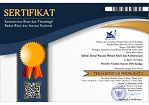Hukum Islam sebagai rekayasa sosial dan implikasinya dalam undang-undang perkawinan di Indonesia
Abstract
This study focuses on the role of Islamic law as social engineering and its implications in marriage law in Indonesia. Islamic law has always been a concern among legal experts and studies. One interesting thing is the effort to achieve justice through the application of Islamic law which functioned as social engineering. Though the nature of Islamic law is the dimension of social justice but at the same dimensions of the Godhead. In the Indonesian context, it is understood that the marriage law in Indonesia is the implication. As this study included the study of literature and research data analyzed by the theory of law as a social engineering with the sociological approach. The results of this study concluded Law Islamic law can function and formulated as social engineering in the form of state regulation and in fact it is contained in the articles of the Marriage Law in Indonesia.
Keywords
Full Text:
PDFReferences
Anshori, Abdul Ghofur. Filsafat Hukum, Sejarah, Aliran dan Pemaknaan. Yogyakarta: Gadjah Mada University Press, 2005.
______________________. Filsafat Hukum Kewarisan Islam Konsep Kewarisan Bilateral Hazairin. Yogyakarta: UII Press, 2010.
Azhari, Fathurrahman. “Dinamika Perubahan Sosial dan Hukum Islam”, dalam At-Tahrir Vol. 16, No. 1 (Mei 2016): 198-207.
Ergene, Bogac A. “ Islamic Law in Action: A Historical Discussion” dalam Law and Social Inquiry Vol. 38, No. 4, (2013): pp. 1041-1042.
Fitriyani, Ab Basir Laupe, “Positivisasi Hukum Islam dalam Pembinaan Hukum Nasional di Indonesia” dalam Al-Ulum (Jurnal Studi Islam) Vol. 13, No. 2, (Desember 2013): pp. 457.
Gray, Christoper Berry (ed). The Philosophy of Law an Encyclopedia. New York and London: Garland Publishing, 1999.
Gurvitch, Georges. Sociology of Law. London: Open University, 1947.
Hermawati, Nety. “Respon Terhadap Hukum Perkawinan di Indonesia”, dalam Al-Mizan Vol. 11, No. 1, (Juni 2015): 38-43.
Hidayat, Fatah, “Dinamika Perkembangan Hukum Keluarga di Indonesia, dalam Jurnal An Nisa” Vol. 9, No. 2, (Desember 2014): pp. 1-14.
Ishak, Ajub. “Ciri-ciri Pendekatan Sosiologi dan Sejarah dalam Mengkaji Hukum Islam”, dalam Al Mizan Vol. 9, No. 1, (Juni 2013): 71.
Kansil, C.S.T. Pengantar Ilmu Hukum dan Tata Hukum Indonesia. Jakarta: Balai Pustaka, 1989.
Komisi Yudisial Republik Indonesia. Menimbang Ulang Hukum sebagai Saran Rekayasa Sosial. Jakarta: Sekretariat Jenderal Komisi Yudisial Republik Indonesia, 2012.
Rosana, Ellya. “Hukum dan Perkembangan Masyarakat”, dalam Jurnal TAPIs Vol. 9, No. 1, (Januari-Juni 2013): 109.
Setiyanto, Danu Aris. Tuhan, Ridhoi Kami: Kajian Perkawinan Beda Agama Pasca Putusan Mahkamah Konstitusi. Surakarta: BukuKu Media, 2016.
Shaham, Ron. “Custom, Islamic Law, and Statutory Legislation: Marriage Registration and Minimum Age at Marriage in the Egyptian Sharīʿa Courts”, dalam Islamic Law and Society, Vol. 2, No. 3, (1995): 258.
Soekanto, Soerjono. Pokok-Pokok Sosiologi Hukum. Jakarta: RajaGrafindo Persada, 2013.
Suherman, Gatot. “Fiqh Mazhab Indonesia Konsep dan Aplikasi Pemikiran Hasbi as-Siddiqi untuk Konteks Islam Rahmat li Indonesia”, dalam Al-Mawarid Vol. XI, No. 1, (Agustus 2010): 112.
Yusdani. Menuju Fiqh Keluaga Progresif. Jakarta: Kaukaba, 2015.
DOI: https://doi.org/10.18326/ijtihad.v17i2.175-189
Refbacks
- There are currently no refbacks.

This work is licensed under a Creative Commons Attribution-ShareAlike 4.0 International License.
Ijtihad: Jurnal Wacana Hukum Islam dan Kemanusiaan by http://ijtihad.iainsalatiga.ac.id/ is licensed under a Creative Commons Attribution-ShareAlike 4.0 International License







